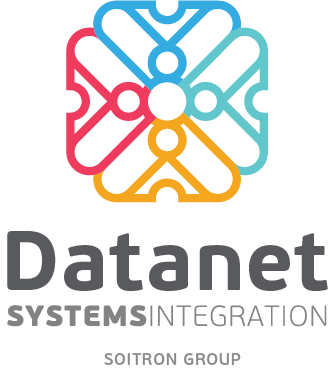Containers have become, over the last four years, the unanimous solution adopted by organizations for porting applications between their own infrastructures and multi-cloud environments, but also for upgrading on-premises solutions. However, intensive use of containers leads to an inherent increase in the level of complexity. Datanet Systems specialists can help you keep under control this complexity with the help of Cisco Container Platform.

Datanet Systems provides Zoom International call center recording systems for customer calls, in compliance with GDPR requirements.
The simplicity of porting applications, the ability to separate functionalities into micro-services, the speed with which containers can be developed, moved and deployed, their independence from existing infrastructure and low resource consumption (compared to classic virtual machines) are the main reasons why organizations use intensive containerization technologies. Nevertheless, easy use has generated a rapid proliferation of containers, leading to the emergence of a new problem – managing them. Answers already exist – Docker Swarm, Mesos and Kubernetes are, currently, the most popular container orchestration platforms used globally.
Starting 2017, Kubernetes – the Open Source project launched by Google in 2014 – is quoted as the de facto standard in the multi-cloud area. A status confirmed by the announcements made by the main players who have rallied to the cause:
- Microsoft has announced the availability of Kubernetes support in Azure Container Service;
- Amazon launched the Elastic Container Service for Kubernetes;
- Cloud Native Computing Foundation in partnership with the Linux Foundation initiated Kubernetes Certified Service Provider and Certified Kubernetes Administrator programs;
- Docker finally capitulated and offered support for Kubernetes (without giving up his own platform, Swarm).
Cisco Container Platform strengths for Kubernetes environments
Last year, the list of important announcements included Cisco’s partnership with Google to deliver a new Hybrid Cloud solution designed to facilitate the use of on-premises solutions on Google Cloud platforms using Kubernetes technology. The announcement also prepared the launch of its own container orchestration and container management platform, Cisco Container Platform (CCP), which took place in April 2018.
Anuntul a pregatit lansarea „propriei“ platforme de orchestrare si management a containerelor, Cisco Container Platform (CCP), care a avut loc in luna aprilie 2018.
“With the help of containers, developers have a simple and fast way to build, port, and run containerized applications, regardless of their type or the infrastructure they run on. The first problem is that, while developers want shorter cycles, IT teams need tools to help them manage applications from the start of the development process to their actual entry into production and also during their operation, without having to modify the infrastructure or operational models for each application.
The second major challenge is that container movement and proliferation increase the complexity of configurations – containers have their own dependencies, they need a network infrastructure on which specific rules can be applied, they have to follow security policies, compliance standards, etc. Cisco Container Platform responds precisely to this need – it helps not only to develop and release multiple containers but also monitors them, manages them throughout their entire lifecycle and automates their maintenance by eliminating repetitive tasks. Additionally, Cisco Container Platform responds to issues that other platforms do not offer performant solutions such as “Network Management,” “Load Balancing” or “Persistent Storage,” explains Mihai Gagea, Presales Consultant at Datanet Systems.
Advantages of Cisco Container Platform
One of the main differentiators of the Cisco platform is that it is delivered as a turnkey solution for production environments, simplifying porting between cloud and on-premises applications. Secondly, CCP allows easy integration of third-party Open Source solutions, which gives it flexibility over other proprietary solutions of its kind.
“CCP is a collection of over 20 Open Source products that Cisco has packaged in a pre-tested and configured product, such that it’s safe to use and easy to develop and manage,” said the Datanet specialist.
Currently, the Cisco platform integrates the following components:
- Runtime: Docker;
- Operating System: Ubuntu;
- Orchestration: Kubernetes;
- IaaS: vSphere;
- Infrastructure: HyperFlex;
- Network Interface Container (CNI): Cisco ACI, Contiv, Calico;
- SDN: Cisco ACI;
- Container Storage: HyperFlex Flex Driver;
- Load Balancing: NGINX, Envoy;
- Serrvice Mesh: Istio, Envoy;
- Monitoring: Prometheus, Grafana;
- Logging: Elasticsearch, Fluentd, Kibana (EFK).
Each of the solutions listed can be used individually and manually configured, but the advantage of the Cisco platform lies in the fact that all of these applications are pre-set so as to come together as a stable unitary system. Practically, with this integration, Cisco has created a single solution that allows the automation of an extensive range of operations, delivering speed, operational reliability, and efficiency for developers.
A third competitive advantage is Cisco’s guaranteed support for the entire suite. An important addition to most of the Open Source distributions, considering that their update pace is atypical, and updates and patches applied to each application across the platform can cause compatibility issues. Cisco solves all these issues through the Technical Assistance Center (TAC), which for customers translates into the advantage of calling a single support center.
A promising road map
The first version of the Cisco platform, launched in April 2018, is designed to work optimally on the proprietary hyperconvergence infrastructure solution HyperFlex. However, according to company officials, from version 2.0 (which will most likely be released by the end of 2018), the software will be disconnected from the infrastructure, the platform is able to operate on any third-party VMware infrastructure (provided it runs a version of VCenter Server 6.5 or higher). CCP platform integration with Cisco Cloud Center is also expected, a solution that covers workload management needs in public Cloud environments (Amazon, Azure, Google), providing an overview of all resource consumption.
“In the future, Cisco promises that we can easily port containers from one environment to another – whether we develop them in Amazon, Azure or Google and are put into production in our own infrastructure or they are put into production in our own Data Center and we want to update them to a new version. In the latter situation, we will clone them in a public Cloud, then apply patches to them, test them in that environment and then bring them back to the local production environment, ” explains Mihai Gagea.
Some promises are already confirming- in early November 2018, Cisco announced a partnership with Amazon Web Services, which resulted in the integration of the CCP platform with Amazon Elastic Container Service for Kubernetes (EKS). For developers, Cisco-AWS integration means the freedom of no longer needing to write applications differently, depending on the environment in which they run, in the Cloud, or in their own Data Center. For IT teams, integration facilitates the use of a common set of tools (such as Amazon Identity and Access Management authentication mechanism, which can be used by both CCP and EKS, the use of a single “warehouse” for container images, such as Amazon Elastic Container Registry, etc.)
The recent partnership with Amazon confirms that Cisco Container Platform, although a recently launched product, already has a market presence among companies that increasingly feel the need to port their applications between their own infrastructure and multi-cloud environments or who want to upgrade their on-premises solutions.
If you fit into these categories and want to capitalize on the use of containers at the pace of your organization, maximizing on-site investments and avoiding the risk of dependence on one supplier, please contact us at: office@datanets.ro. Complementary to Cisco Container Platform, Datanet offers you a diversified and modern portfolio of integrated datacenter infrastructure systems made up of Cisco, EMC, VMware, Veeam, NetApp, Fujitsu, F5 products.
 Are you prepared for a DDoS attack?
Are you prepared for a DDoS attack?
